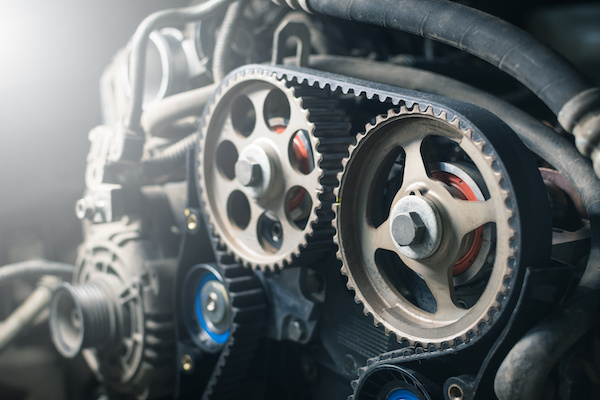Posted on 1/20/2025

Why Is My Car Making a Clicking Noise When I Try to Start It? If you’ve ever put your key in the ignition, turned it, and been greeted by a rapid “click, click, click” instead of your engine roaring to life, you know how frustrating this can be. A clicking noise when trying to start your car typically indicates a problem with your vehicle’s starting or electrical system. Let’s dive into the common causes of this issue, the steps you can take to address it, and how Grand Garage in Escondido, CA can help you resolve the problem quickly and efficiently. Common Causes of a Clicking Noise When Starting Your Car 1. Weak or Failing Battery The number one cause of a clicking noise is a weak or failing battery. While a completely dead battery often results in no noise at all, a weak battery can engage the starter motor without having enough power to crank the engine, leading to the clicking sound. Possible Symptoms: Rapid clicking noise when t ... read more
Posted on 1/12/2025

Why Does My Car Shake at Idle? | Grand Garage Is your car shaking when it’s idling? At Grand Garage, located at 1556 E Grand Ave, Escondido, CA 92027, we understand how frustrating and concerning this issue can be. Your car should run smoothly, and excessive vibrations at idle often indicate an underlying problem that needs attention. With decades of experience in automotive repair, our team is here to help you identify the cause and get your vehicle back to optimal performance. Common Causes of Car Shaking at Idle When your car shakes at idle, it’s often a sign that something isn’t functioning as it should. Here are the most common culprits: 1. Engine Misfires A misfiring engine can cause your car to shake. This happens when one or more of the cylinders fail to ignite properly. The reasons for misfires can include: Worn Spark Plugs: If your spark plugs are old or damaged, they may not ignite the ... read more
Posted on 1/6/2025

Why Does My Car Heater Have a Bad Smell? When the temperature drops, your car heater becomes indispensable. However, a foul smell emanating from your heater can ruin your comfort and may even signal underlying issues with your vehicle. Let’s delve into the reasons why your car heater might smell bad and how Grand Garage, located at 1556 E Grand Ave, Escondido, CA, can help restore freshness and functionality to your car. Common Causes of a Bad Smell from Your Car Heater 1. Mold and Mildew in the HVAC System Mold and mildew are common culprits when it comes to unpleasant odors in your car’s heating system. The evaporator core often traps moisture, creating a perfect environment for bacteria and mold growth. Signs: Musty or damp smell when the heater is turned on. Odor decreases slightly after running the system for a while. Why It Happens: Moisture buildup inside the HVAC system fosters the growth of mold spores, which are circulated when air passes thr ... read more
Posted on 12/30/2024

Why Grand Garage is Escondido's Trusted Name for Auto Repairs When your car experiences a sudden issue, you need a repair shop that combines reliability, speed, and expertise. Whether it’s an emergency breakdown or a routine maintenance visit, Grand Garage in Escondido, California, stands out as a dependable solution for all your automotive needs. With a reputation for excellence and a customer-first approach, Grand Garage ensures your car is back on the road in no time. About Grand Garage Address: 1556 E Grand Ave, Escondido, CA 92027 Phone: (760) 546-5475 Website: grandgarageescondido.net Located in the heart of Escondido, Grand Garage has become a staple for drivers seeking high-quality automotive care. Their team of experienced technicians is dedicated to providing exceptional service, whether you need emergency repairs or preventative maintenance. Grand Garage prioritizes customer satisfaction, ensuring ev ... read more
Posted on 12/23/2024

Grand Garage: Reliable Alternator Repairs in Escondido, CA When your car’s alternator fails, it can disrupt your entire day. From dimming headlights to a dead battery, a malfunctioning alternator can lead to unexpected breakdowns and costly repairs. For drivers in Escondido, CA, Grand Garage is the trusted destination for professional alternator diagnostics and repair. Located at 1556 E Grand Ave, Grand Garage delivers exceptional service and expert care to keep your vehicle running smoothly. Why the Alternator is Crucial to Your Car’s Performance The alternator is a key component of your vehicle’s electrical system. While the battery starts your car, the alternator takes over once the engine is running, generating electricity to power your vehicle’s systems and recharge the battery. It ensures that essential components like headlights, power windows, and the air conditioning function properly. Without a functioning alternator, your battery wi ... read more
Posted on 12/16/2024

Why Does My Car Vibrate at High Speeds? Have you noticed your car vibrating at high speeds? It’s more than just an inconvenience—it can be a warning sign of underlying issues that require attention. Ignoring these vibrations could lead to costly repairs or compromise your safety on the road. At Grand Garage, located at 1556 E Grand Ave, Escondido, CA, we specialize in diagnosing and resolving vehicle issues, including those that cause high-speed vibrations. Call us today at (760) 546-5475 or visit grandgarageescondido.net to schedule an appointment. Let’s explore the most common causes of car vibrations and why addressing them promptly is essential. Common Causes of Car Vibrations at High Speeds 1. Unbalanced Tires Unbalanced tires are one of the most common causes of car vibrations. Minor imperfections in your tires can lead to noticeable shaking, especially at higher speeds. Here’s how the issu ... read more
Posted on 12/9/2024
.jpeg)
The Complete Guide to Battery Replacement at Grand Garage in Escondido, CA Your vehicle’s battery is the heart of its electrical system. Without it, you wouldn’t be able to start your car, let alone power any of its accessories. While many drivers focus on oil changes and tire maintenance, battery care often gets overlooked. At Grand Garage, conveniently located at 1556 E Grand Ave, Escondido, CA 92027, we’re here to ensure your vehicle’s battery stays in top condition and provide seamless battery replacement services when needed. This guide will explore the importance of battery maintenance, signs of a failing battery, and why Grand Garage is your go-to solution for battery replacement in Escondido. Why Your Car Battery Is Crucial The battery in your car powers more than just the engine. It supplies electricity to the starter, ignition system, and all your vehicle’s electronics, including: Headlights and interior lights Infotainment sy ... read more
Posted on 12/2/2024

"Rotten Egg Smell in Your Car? Grand Garage in Escondido, CA, Has the Fix!" Introduction: Don’t Let Car Odors Drive You Crazy Have you noticed a distinct rotten egg smell when you start or drive your car? This isn’t just an unpleasant experience—it’s a sign that something is wrong with your vehicle. At Grand Garage in Escondido, CA, we specialize in diagnosing and repairing the issues that cause these smells. From catalytic converters to exhaust system leaks, we’ve got you covered. Why Does Your Car Smell Like Rotten Eggs? The rotten egg smell is caused by hydrogen sulfide, a sulfur compound that is a byproduct of fuel combustion. Typically, your car’s catalytic converter neutralizes this gas. When the converter or other systems malfunction, the smell escapes. Here are the common causes: Catalytic Converter Problems Your catalytic converter is responsible for converting toxic gases into less harmful subst ... read more
Posted on 11/29/2024
.jpeg)
How Do I Know If My Car Needs Brakes? Grand Garage’s Expert Guide for Escondido Drivers In sunny Escondido, CA, where daily commutes and weekend trips to nearby attractions like Dixon Lake or San Diego Zoo Safari Park are the norm, your vehicle's braking system is vital for your safety and the safety of others. At Grand Garage, we specialize in keeping your car’s brakes in top condition, ensuring smooth and reliable stops wherever your journey takes you. Knowing when your brakes need attention is key to avoiding costly repairs and potential accidents. In this guide, we’ll outline the common signs of brake trouble, why brakes wear out, and how Grand Garage can help Escondido drivers stay safe on the road. Why Brakes Are Crucial in Escondido Escondido’s diverse driving conditions, from city streets to nearby mountainous terrains, place unique demands on your brakes. Whether you’re navigating stop-and-go traffic on East Grand Avenue or ... read more
Posted on 11/25/2024

Do I Need a Good Relationship with My Mechanic? Absolutely—Here’s Why When it comes to maintaining and repairing your car, there’s one thing that often gets overlooked: your relationship with your mechanic. Sure, it might seem like a simple transaction—you bring your car in, they fix it, you pay, and you leave. But in reality, it’s much more than that. Having a strong, honest relationship with your mechanic is essential, not just for the health of your vehicle but for your own peace of mind. After all, your mechanic plays a vital role in ensuring the safety and reliability of the machine you depend on every day. Let’s dive into why this relationship matters and how you can make it work for both parties. Mechanics: Modern-Day Rocket Scientists First, let’s address a common misconception: mechanics are not just “grease monkeys.” Far from it. Modern vehicles are marvels of engineering, combining advanced technologies ... read more